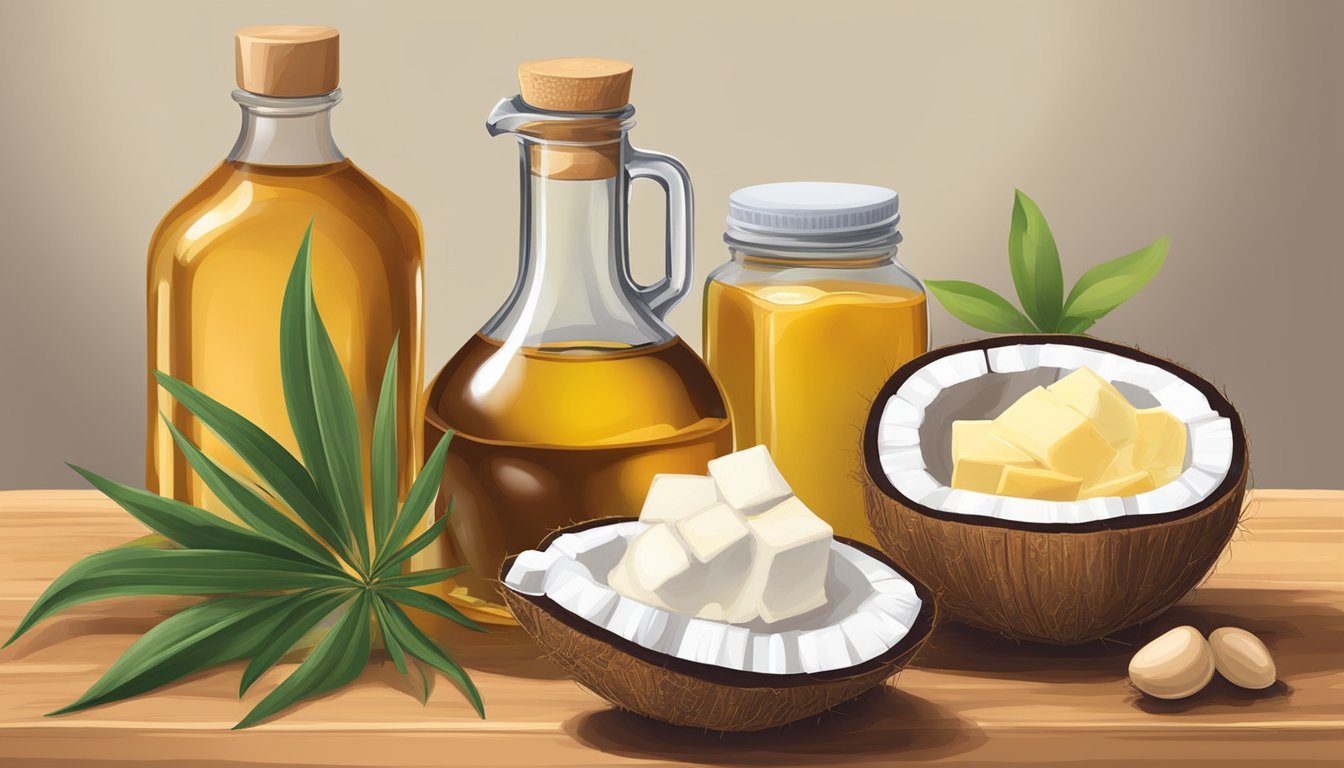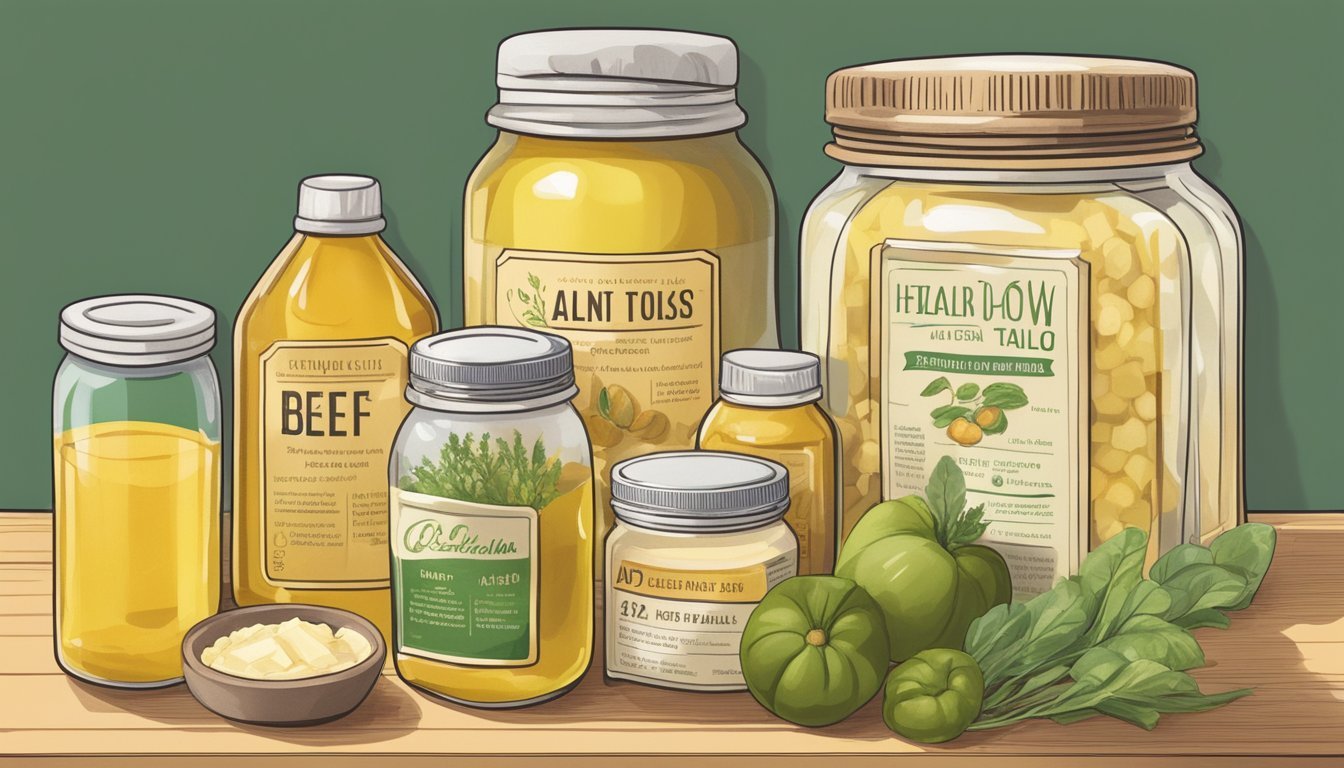Beef Tallow Substitutes
Best Alternatives for Cooking and Baking
For those seeking alternatives to beef tallow, the search for suitable substitutes can be both exciting and daunting. Understanding that whether you're aiming to reduce animal fat intake, dealing with dietary restrictions, or simply looking for healthier options, there are many viable alternatives to explore. Lard, for instance, is a popular substitute made from rendered pig fat, boasting a similar consistency and flavor to beef tallow.
Another excellent option is ghee, clarified butter known for its rich, nutty flavor and high smoke point, making it ideal for various cooking methods. Coconut oil, with its unique flavor and versatility, also serves as a healthy replacement, especially for those following a plant-based diet. Each substitute brings its own unique traits to the table, allowing for experimentation to find the perfect fit for your culinary needs.
Understanding Beef Tallow
Beef tallow, derived from the fat of cattle, is a versatile cooking fat known for its rich flavor and high smoke point. It is obtained through rendering and is widely used in various culinary applications.
Definition and Production
Beef tallow is a form of rendered fat from beef, typically made from suet, which is the hard fat found around the kidneys and loins. Rendering involves melting the fat at a low temperature and then straining it to remove impurities. The result is a pure, shelf-stable fat that can be stored at room temperature.
The process of rendering tallow ensures that it retains its nutritional benefits while becoming suitable for long-term storage, making it a valuable ingredient in many kitchens.
Characteristics of Beef Tallow
Beef tallow has a rich, meaty flavor that enhances the taste of many dishes. Its high smoke point of around 400°F (204°C) makes it ideal for high-heat cooking methods such as frying and roasting.
Due to its high content of saturated fat, tallow is solid at room temperature but melts when heated, providing a smooth texture. This property makes it useful in baking, especially in creating flaky pastries and crispy textures.
Additionally, beef tallow's shelf stability means it can be stored for long periods without refrigeration, adding to its convenience for use in various recipes.
Culinary Uses
Beef tallow is widely used in frying, baking, roasting, and other cooking methods. Its high smoke point makes it excellent for deep-frying items like French fries and crispy chicken, as it can handle the high temperatures without breaking down.
In baking, tallow can be used to create flaky pastries and tender pie crusts. It adds a savory depth to recipes by imparting its unique flavor.
For roasting, beef tallow can coat vegetables or meats, resulting in caramelized, crispy exteriors. Its use in sautéing also brings a rich taste to sautéed greens and other vegetables.
Dietary Considerations and Health Implications
Substitutes for beef tallow must be chosen based on nutritional profiles, potential health benefits or concerns, and the specific dietary preferences or restrictions of individuals.
Nutritional Profile
Beef tallow contains saturated fats and small quantities of monounsaturated fats. Substitutes often vary in their fat composition. For instance, olive oil is high in monounsaturated fats, which are considered heart-healthy. Coconut oil provides medium-chain triglycerides (MCTs) that may benefit metabolism. Meanwhile, vegetable shortenings can offer lower saturated fats but higher trans fats, which are unfavorable.
The nutrient content also differs widely. Olive oil offers antioxidants and vitamin E. Avocado oil provides potassium and fiber. Ensuring a balanced intake of nutrients is crucial when switching fat sources.
Health Concerns and Benefits
Consuming large amounts of saturated fats, like those in beef tallow, can elevate cholesterol levels, potentially increasing heart disease risk. Unsaturated fats, prevalent in substitutes such as olive oil or avocado oil, may lower inflammation and support the immune system.
Beef tallow also contributes to a higher intake of vitamins A, D, and K. Conversely, plant-based options like coconut oil or palm oil provide different nutritional benefits but may lack some fat-soluble vitamins. Moderation is key to avoid adverse effects associated with excessive fat consumption.
Dietary Preferences and Restrictions
Those on vegetarian or vegan diets will commonly avoid animal fats like beef tallow. Suitable substitutes include coconut oil, olive oil, and other plant-based oils.
Individuals following Paleo or Keto diets may opt for high-fat substitutes that align with their dietary patterns, such as coconut oil or ghee, which maintain a high-fat, low-carbohydrate profile. For those with lactose intolerance, utilizing plant-based substitutes can avoid digestive issues.
Ethical considerations also play a role in choosing animal-free fats for those committed to animal welfare. This makes plant-based alternatives attractive, aligning with multiple dietary restrictions and preferences.
Substitutes for Beef Tallow
When replacing beef tallow in your cooking, there are a variety of alternatives ranging from animal-based to plant-based and specialist substitutes. Each alternative has unique properties, such as specific smoke points, flavor profiles, and textures, making it important to choose the right one for your needs.
Animal-Based Substitutes
Animal-based substitutes for beef tallow closely mimic the original in terms of flavor and cooking properties. Lard, derived from pork fat, is renowned for its high smoke point and rich, savory flavor, making it excellent for frying and baking. It provides a similar mouthfeel and consistency to beef tallow.
Duck fat offers a nuanced, slightly gamey flavor which can elevate the taste of dishes, particularly in roasting vegetables or making confit. Chicken fat, also known as schmaltz, imparts a distinct, savory flavor suitable for sautés and frying, and has a moderately high smoke point.
Ghee (clarified butter) removes milk solids, resulting in a higher smoke point and a nutty flavor. Butter itself can be used, but it has lower smoke point due to milk solids, making it less suitable for high-temperature cooking compared to tallow or ghee.
Plant-Based Substitutes
Plant-based alternatives provide a range of flavors and health benefits. Coconut oil is popular due to its high smoke point and subtle coconut flavor, though refined versions have neutral flavor. It's versatile for both savory and sweet dishes.
Olive oil, especially EVOO, offers a robust flavor profile, making it ideal for dressings, marinades, and low to medium-heat cooking. Palm oil is another option, with a neutral taste and high smoke point, useful in frying and baking.
Vegetable oils, such as canola or peanut oil, are known for their neutral flavor and high smoke points, making them suitable for a variety of cooking methods. Avocado oil is celebrated for its high smoke point and mild flavor, making it an excellent choice for both sautéing and frying.
Specialist Substitutes and Alternatives
Specialist substitutes include vegetable shortening and margarine, designed to replace animal fats with hydrogenated vegetable oils. Shortening provides a similar consistency and texture to tallow in baking, making flaky pastries and pie crusts possible without animal fats.
Hydrogenated oils are engineered to mimic the properties of tallow and lard, offering stability and mouthfeel in recipes requiring solid fats. Nut butters like almond butter can replace tallow in specific baking situations, adding a nutty flavor and moisture.
Table of Smoke Points (Approximate Values)
Fat/Oil Smoke Point (°F) Comment Lard 370 Rich, savory flavor Duck fat 375 Slightly gamey flavor Chicken fat 360 Savory, distinct flavor Ghee 485 Nutty flavor, high smoke point Butter 300 Lower smoke point, buttery taste Coconut oil 350-400 Neutral in refined form Olive oil 375-405 Robust flavor Palm oil 450 Neutral in taste Vegetable oil 400-450 Neutral flavor Avocado oil 520 Mild flavor, excellent for frying
Optimizing Use of Substitutes in Cooking
Choosing the right substitute for beef tallow involves understanding the smoke points, texture, and flavor profiles of alternative cooking fats. Different dishes can benefit from specific substitutes based on these factors.
Matching Smoke Points
Selecting a substitute with an appropriate smoke point is crucial for various cooking methods like frying, roasting, and sautéing. Lard, canola oil, and vegetable oil are excellent choices as they possess high smoke points similar to beef tallow.
For deep frying, opt for oils that can withstand high heat without breaking down, such as palm oil or ghee. These oils ensure a consistent cooking temperature, preventing burnt flavors and maintaining the integrity of the dish.
Fat Smoke Point (°F) Beef Tallow 400 Palm Oil 450 Ghee 485 Canola Oil 400 Vegetable Oil 400
Texture and Flavor Considerations
When substituting beef tallow, attention should be given to the texture and flavor profiles of the alternatives. Butter and vegetable shortening add richness and a creamy mouthfeel, making them suitable
Sustainability and Shopping Tips
Finding sustainable and high-quality beef tallow substitutes not only ensures better environmental practices but also enhances your cooking experience. Below, we discuss how to select sustainable options and offer tips on purchasing and storing these alternatives.
Selecting Sustainable Options
Choosing sustainable options often starts with plant-based alternatives. Coconut oil and palm oil are more sustainable than animal-derived fats. However, ensure the palm oil is certified by the Roundtable on Sustainable Palm Oil (RSPO) to avoid environmental degradation.
Homemade tallow from local, organically raised animals can be a more eco-friendly option compared to mass-produced tallow. When sourcing animal fats like lard or schmaltz, look for organic and free-range labels.
Another consideration is the fat's makeup. Some plant-based oils have a healthier profile, such as olive oil, which is rich in monounsaturated fats.
Purchasing and Storage
Health food stores are excellent places to find high-quality and sustainable substitutes. Look for products with minimal additives and certifications like USDA Organic or RSPO.
Vegetable shortening, duck fat, ghee, and butter can often be found in both specialty and standard grocery stores. Checking the shelf-life is crucial; plant-based oils generally have a longer shelf-life compared to animal fats.
For homemade tallow or other fats, use airtight containers to prolong freshness. Store fats like coconut oil and palm oil in cool, dark places to maintain their quality and prevent spoilage.
In addition, consider the cookware you're using. Cast iron pans are excellent for cooking with oils and fats due to their even heat distribution and non-stick properties when seasoned correctly.
By following these tips, you can ensure you're making choices that are both sustainable and practical.






